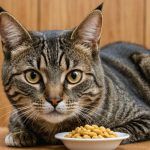Understanding the Connection Between Diet and Urinary Tract Health
The diet and urinary health of cats are intricately linked, with nutrition playing a crucial role in maintaining a healthy urinary tract. Cats need a balanced diet to prevent urinary issues such as infections or blockages, which can be deeply distressing and detrimental to their health.
A diet deficient in essential nutrients can lead to urinary problems. For example, insufficient intake of magnesium and certain vitamins can contribute to the formation of urinary crystals or stones. Maintaining an optimal balance of minerals and nutrients is vital for supporting a healthy urinary environment, which helps to prevent the crystallisation of minerals in the urinary tract.
Also to read : Designing the ultimate cat hydration haven: how to cater to feline fans of running water
A balanced diet not only involves the right nutrients but also requires an adequate supply of water. Cats thrive on a diet rich in moisture to keep their urinary system flushed and healthy. High moisture content in their food helps to dilute urine, reducing the likelihood of stone formation.
Feeding your cat a diet specifically designed for urinary health can greatly affect their overall well-being. Such diets typically include ingredients that help maintain the urinary tract’s pH level and protect the bladder lining. Providing proper nutritional support is a fundamental part of preventing urinary issues in cats.
In the same genre : Create the purr-fect nap haven: design a cat-friendly retreat that harmonizes with their sleep habits
Recommended Foods for Urinary Tract Health
Choosing the best cat foods for urinary health is pivotal for preventing urinary issues. Foods rich in moisture and low in ash content can help dilute urine, decreasing the risk of stone formation. Prioritising meals with balanced minerals like magnesium, calcium, and phosphorus also aids in maintaining urinary tract health.
Nutritional components are key in these specialised diets. Many of the top brands, such as Hill’s Science Diet and Royal Canin Urinary SO, specifically formulate their products to dissolve struvite stones and promote a balanced urinary environment. These formulas typically maintain a controlled pH level that discourages crystallisation of minerals in your cat’s urinary tract.
High moisture content is another critical factor; wet food naturally contains more water than dry kibble. This advantage helps in hydrating your cat and ensuring their bladder is flushed regularly. It is recommended to combine wet food with dry kibble to ensure nutritional variety while maintaining hydration levels.
When choosing cat food, consider factors like age, weight, and overall health conditions. Always consult with your veterinarian to select the most suitable diet for your feline friend. This proactive approach can significantly impact their long-term urinary health.
Importance of Hydration in Preventing Urinary Infections
Ensuring proper cat hydration strategies is crucial in preventing urinary infections. Cats often drink less water than needed, making it essential to encourage hydration actively. An effective way is by offering wet food, which inherently has a higher moisture content compared to dry kibble. This not only promotes fluid intake but also helps dilute urine, reducing infection risk.
Encouraging drinking through innovative solutions, such as water fountains, can be particularly effective. Most cats enjoy running water, which can stimulate their interest in drinking more frequently. Additionally, adding ice cubes to a cat’s water bowl might intrigue them and make water consumption more appealing.
Some cats may need further encouragement. Placement of multiple water sources throughout the home can increase accessibility and convenience, leading to improved hydration habits. Each strategy plays a role in not just hydrating your cat but also in flushing the urinary system regularly, preventing crystal and stone formation.
Balancing cat hydration with moisture-rich diets fosters a healthier urinary system overall. These strategies help owners overcome the challenges of keeping their cats hydrated, significantly impacting their urinary tract health and reducing potential complications.
Supplements and Their Role in Urinary Health
Understanding the role of urinary health supplements for cats is vital in supporting a cat’s overall urinary well-being. While a balanced diet is essential, sometimes additional supplements like cranberry extract or probiotics can further enhance urinary health. These supplements work by acidifying the urine and promoting healthy bacteria, thus preventing the formation of crystals or stones.
Veterinary advice is crucial when considering supplements. It ensures that supplements complement the cat’s existing diet and are suitable for their specific health needs. Some of the recommended options include:
- Cranberry extract: Known for maintaining urinary tract health by inhibiting bacteria adhesion.
- Probiotics: They help sustain a balanced gut microbiome, indirectly supporting urinary health.
For the best outcomes, use these supplements as part of an overall strategy that includes proper diet and hydration. Conversations with a veterinarian can provide insights into the most effective combination of diet and supplements tailored for your cat. These discussions can help in creating a comprehensive plan that not only prevents urinary issues but also supports the cat’s holistic health.
Recognizing Symptoms of Urinary Tract Infections
Understanding the signs of urinary tract infections in cats is essential for maintaining your feline friend’s health. Early detection can prevent complications and reduce distress. Common symptoms include frequent urination, straining while urinating, blood in the urine, and excessive grooming of the genital area. These indicators suggest discomfort and should prompt immediate veterinary attention.
Prompt care is necessary as untreated infections can lead to more severe conditions, such as kidney damage. Veterinarians will typically advise on dietary adjustments and possibly medication to alleviate symptoms and restore health. Addressing these symptoms early can lead to a full recovery.
Diet changes can significantly impact the progression and management of urinary tract infections. A balanced diet with the proper nutrients can help prevent further issues and improve overall health. For instance, reducing magnesium and phosphorus levels may assist in decreasing crystal formation, while increasing water intake can help flush out the urinary tract.
Early detection paired with dietary and lifestyle adjustments forms a comprehensive approach to managing urinary tract infections. Monitoring your cat for these signs and seeking veterinary guidance ensures a proactive stance in promoting their well-being.
Preventive Measures Beyond Diet
Maintaining cat urinary health involves more than just the right diet. Incorporating various strategies ensures holistic well-being. Exercise plays a key role in urinary health prevention strategies. Regular activity aids digestion and reduces obesity risk, mitigating the development of urinary problems.
Stress management is equally vital. Stress can increase susceptibilities to urinary tract issues, as it may alter hormone levels, affecting bladder function. Using environmental enrichments, like interactive toys and safe spaces, promotes relaxation and mental stimulation.
Never underestimate the importance of regular veterinary check-ups. Routine visits allow early detection of potential urinary problems, enabling timely interventions. Veterinarians can provide personalized advice on maintaining a healthy lifestyle for your cat.
Observing litter box habits is another preventive measure. Changes in urination patterns or litter box aversion can signal urinary distress. Maintaining a clean, accessible litter box encourages good habits and helps catch issues early.
Consider developing a consistent regimen of lifestyle components and regular check-ups. This ensures not only the prevention of urinary issues but also promotes overall health. A proactive approach in these areas supports a satisfying and healthy life for felines.
Resources for Cat Owners
When navigating feline health resources, it’s crucial for cat owners to have access to reliable information. Trusted veterinary websites and publications provide a wealth of knowledge about cat care, including insights into nutrition, behaviour, and common health concerns. These resources guide owners in maintaining their pets’ well-being.
Recommended reading includes books like “Complete Cat Care,” which covers comprehensive feline health and dietary advice. Such literature helps pet owners understand the intricacies of maintaining a healthy lifestyle for their cats, offering practical tips and scientific insights.
Online communities and forums serve as valuable platforms for cat owners to exchange experiences and strategies. Websites like The Cat Site or the PetMD forums allow owners to connect, discuss urinary health tactics, and learn from one another’s experiences. These forums often provide real-world advice and support for resolving health issues.
Engaging with these resources empowers cat owners to make informed decisions about their pets’ urinary health and overall well-being. They offer opportunities to tap into expert advice and peer support, enhancing the owner’s ability to care for their feline companions effectively.










